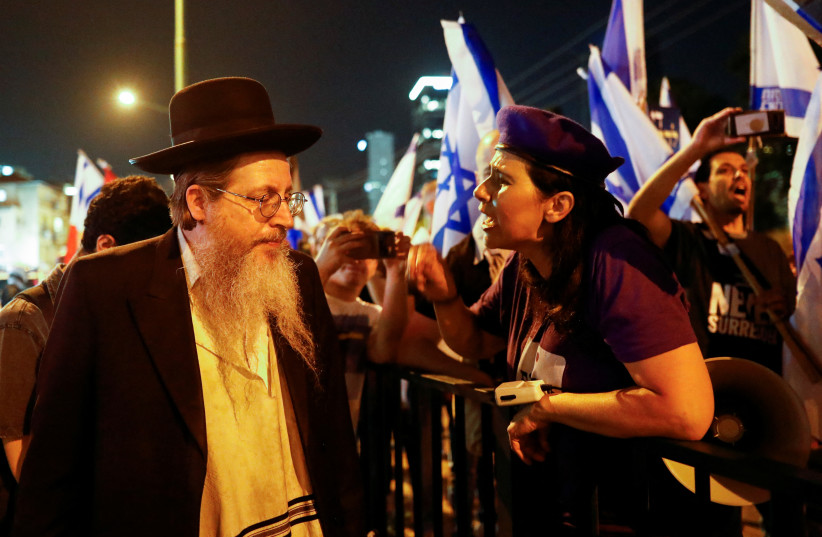We are living in fretful and yes, dangerous times. The measure of how dangerous they are is to note that the recent attack by Palestinian Islamic Jihad, resulting in the highly successful Operation Shield and Arrow, was actually a respite, a hiatus from the true threat hovering over us.
That threat, of course, is ourselves, in which we channel our most self-destructive impulse: the willingness to hate our fellow Jews.
Some of us early on saw an agenda far deeper and more emotional in the protests about judicial reform than the details of how future justices would be selected.
That agenda was suffused with a resentment that bespeaks hatred. The resentment was two-pronged: a feeling that the country that so many in the opposition had fought and sacrificed for was being taken away from them.
Furthermore, that taking was resulting in power and financial resources being transferred to those who were seen not to have been part of the building of the country: the religious, in general, and the haredim, in particular.

Israel's civil disagreements are threatening to become confrontational
The veneer of civil disagreement is wearing thinner and thinner. Demonstrations in Bnei Brak, which started as surprisingly friendly, are threatening to become confrontational.
Haredim have been accused of “sucking our blood” by a highly visible television anchor, and a left-wing former head of the Shabak has called the haredim and many religious Zionists an “existential threat to the State of Israel.”
It is all too easy to point fingers. Everyone has played a part in bringing us near to this precipice, a place we must move away from. The real question is how can we turn down the temperature? How can we build towards mutual understanding, if not outright acceptance?
We can remind ourselves that this is not a new situation, that Ben-Gurion created the deferment for the army draft for a cohort of haredim, which because of their high birth rates, has grown much larger.
We can point out that the percentage of haredim in the workforce has been rising, that haredi social welfare institutions help not just haredim but our society at large and that many haredim willingly opt for a life of material poverty, if not outright privation, in order to live Torah-filled and oriented lives.
For many non-haredim, this does not compute. There is no understanding of the trade-offs that haredim make. Like much of the world regarding Islamic Jihadists, many secular Israelis cannot understand that haredim do not want nor seek the same trappings of life, nor share the same interests, not to mention values, of the secular.
All of this will make communication difficult. But none of it should point to, let alone justify, demonization of the other because, in the grand scheme of things, there is no other. We are all in the same tiny boat together.
HERE IS the best proof of that. Secular Israelis are justifiably proud of the role that they and their forebears played in establishing and building this country. But how were these giants even able to play their role? What had to happen in order for them to stand on the world stage and create, build and sustain a Jewish state?
The seemingly obvious answer was that there had to be a Jewish people: a continuing, tenacious and persistent group of Jews that could be shown a new direction and a new opportunity.
And where did that surviving cohort, that tenacious remnant come from? Overwhelmingly, they are the product of generations and centuries of Jews who held firm and fast to their belief in the God of Israel, in His commandments and laws, and to the traditions and way of life that flowed from them.
Simply stated, if there were not millennia of what we today call religious Jews, there would be no Jewish people to bring back to the Jewish homeland and to create a Jewish state.
This in and of itself should be the reason to stop the denigration, the demonization and the delegitimization of the haredim. Without Jews of great religious conviction, we would have gone the way of the Hittites.
It is more than acceptable, it is understandable, that Jews from different walks of life have difficulty relating to one another. There is, however, a world of difference between not relating to and having contempt for.
Those secular Jews who nevertheless see the importance and necessity of holding true to the Jewish saga (and I believe this is the overwhelming majority of Israeli Jews) must be grateful to the religious and the haredim, as well, for maintaining those links in the chain and for maintaining Jewish literacy.
I do not resent the haredim for seeking financial benefits through their elected representatives. This is classic, bringing home the cholent, as it were, politics. And I, like a great many other Israelis, would like to see all Jews – haredim and rich kids from North Tel Aviv alike – do some form of national service. It need not be the IDF, but something to show that each of us has a part and a stake in Israel.
But if I demonize the haredim for not serving, is that going to make it more likely that they do so? Or would a sincere brother-to-brother appeal to our shared interest in the welfare of our country have a greater likelihood of success?
I choose the latter. I choose to believe that we only help ourselves by letting go of the all-too-easy resentment and approaching one another as brothers and sisters, however different we truly are.
The stakes are immensely high for the Jewish people. This time, we really have to get it right.
The writer is the chairman of the board of Im Tirtzu and a director of B’yadenu and the Israel Independence Fund.
